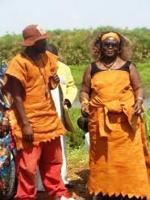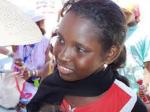Chonyi people and their Culture in Kenya
The Chonyi, also referred to as Achonyi(A person from this tribe may also be referred to as an Mchonyi), are one of the smaller tribes of the Mijikenda on the coast of Kenya.
Their populations can be found in the villages of Lutsangani, Chidutani, Dzitsoni, Bundacho, Ziani,Karimboni, Chigojoni, Dindiri, Junju, Katikirieni, Mwarakaya, Pingilikani, Vwevwesi, Mafisini, Ng'ombeni, Chizingo, Chikambala, Chengoni, Chije, Banda-ra-Salama and Mbuyuni. T
hey are also found in recent settlements areas of Kilifi District like Chumani, Roka, Maweni, Vipingo, Takaungu and Mtwapa. Where "kiti" means chair in Swahili, "Kihi" is Giriama and "Chihi" is Chonyi.
Similar, but recognizably different languages. Like the other Mijikenda tribes, the Chonyi live in settlements known as "Kaya." The original "Kaya Chonyi" is located on a forested hill top. In the center of the Kaya were shrines where the elders or "atumia" would pray to god or "Mulungu".
Origins of Chonyi People
 Karisa, the name given to boys
Karisa, the name given to boysAccording to a Chonyi myth, the Achonyi originated in Singwaya (or Shungwaya), which was to the north of the Somali coast.
They were driven south by the Oromo until they reached their present locations along the ridge, where they built their kayas within a protective setting.
The historical accuracy of this myth is a point of controversy between those who believe that the Mijikenda originated from a single point in the north and those who believe that they do not have a single origin, but migrated primarily from the south.
Naming of Chonyi People

The naming of the chonyi people is symbolic, for example, MBEYU is a name of a girl mbeyu meaning seeds for planting.
KARISA means a boy who is a herder most probably born when her mother was in the field grazing.
NYAVULA is a girl name meaning a rainy season, born during times of rains.
MOKOLI is a boy name meaning a person who is helpful. Names are also often repeated in the family.
The names of the father's uncles and aunts would become the names of his children, this would be repeated with the mother's side of the family.
Once the names from both sides of the family have been used the parents can choose original names. Another interesting fact about names is that the first name of the father will become the last name of the rest of the family.
An example would be if one's name is KARISA MZUNGU, KARISA would be the last name of his children and wife. Although it is a tradition to name your family in this way it is a practice that is slowly fading.
 Nyavula the name given to girls
Nyavula the name given to girlsMore about Afican Culture
Kenya Cultural Origins | Kenya Student Rules | Kikuyu People | Luo in Kenya | Masai People | Samburu People | Student Class Rules | Turkana People in Kenya |Kenya Culture | Akamba | Bantu | British Colonialists | Crafts | Cultural Business Meetings | Cultural Communication | Cultural Eye Contact | Cultural Gestures | Gift Giving | Cultural Law | Cultural Music | Cultural Space | Cultural Time | Kenya Art | Kenya Festivals | Kenya Gender Issues | Kenya Gestures | Kenya Greetings | Kenya History | Kenya Language | Kenya Literature | Kenya Modern Culture | Kenya Music | Kenya National Anthem | National Dress Cord of Kenya | Kenya People | Kenya Respect | Kenya Taboos | Kenya Television and Culture | Kenya Cultural Origins | Kenya Student Rules | Kikuyu People | Luo in Kenya | Masai People | Samburu People | Student Class Rules | Banyankole People | Masaba People | Madi People | Lugbara People |
Lango People | Bakiga People | Karamajong People › | Kakwa people › | Kadam People › |
Jie People › | Ik People › | Bahororo People › | Hima People › | Dodoth People › | Basoga People › | Banyoro People › | Bakonzo People › | Batwa People › | Basamia Bagwe people › | Banyole People › | Bagwere People › | Bagisu People › | Baganda People › | Bafumbira People › | Ateker People › | Aringa People › | Bamba people › | Alur people › | Japadhola People › | Acholi Peoole › | Toro People › | Kumam People › | Baruuli Banyala People › | Songora People › | Sebei People › | Nubi People › | Oropom People › | Samburu people › | Elgeyo People › | Orma People › | Okiek People › | Njemps People › | Nandi People › | Mijikenda People › | Meru People › | Masai People › | Luo People › | Mbeere People › | Luhya People › | Kuria People › | Kipsigis People › | Kikuyu People › | Kalenjin People › › | Kubras People › | Iteso People › | Gusii People › | Giriama People › | Gabbra People › | Embu People › | El molo People › | Tutsi People › | Tugen People › | Turkana People › | Terik People › | Taveta People › | Taita People › | Swahili People › | Somali People › | Segeju People › | Isukha People › | Rendile People › | Duruma People › | Pokot People › | Pokomo People › | Marakwet People › | Digo People › | Choyi People | Daharo People › | Boni People › | Arrow People › |
Recent Articles
-
Garam Masala Appetizers ,How to Make Garam Masala,Kenya Cuisines
Sep 21, 14 03:38 PM
Garam Masala Appetizers are originally Indian food but of recent, many Kenyans use it. Therefore, on this site, we will guide you on how to make it easily. -
The Details of the Baruuli-Banyara People and their Culture in Uganda
Sep 03, 14 12:32 AM
The Baruuli-Banyala are a people of Central Uganda who generally live near the Nile River-Lake Kyoga basin. -
Guide to Nubi People and their Culture in Kenya and Uganda
Sep 03, 14 12:24 AM
The Nubians consist of seven non-Arab Muslim tribes which originated in the Nubia region, an area between Aswan in southern







New! Comments
Have your say about what you just read! Leave me a comment in the box below.